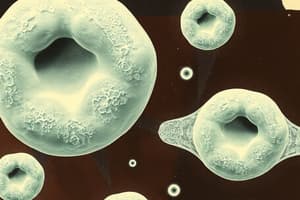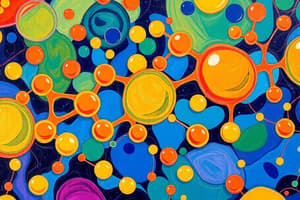Podcast
Questions and Answers
What are some examples of lipids?
What are some examples of lipids?
Fats, oils, steroids, waxes
What distinguishes lipids as a class of compounds?
What distinguishes lipids as a class of compounds?
Insolubility in water and solubility in nonpolar solvents
Why are lipids important in biological systems?
Why are lipids important in biological systems?
They form the cell membrane
What are triglycerides used for in biological systems?
What are triglycerides used for in biological systems?
Name two examples of polar lipids.
Name two examples of polar lipids.
What is the purpose of the acrolein test?
What is the purpose of the acrolein test?
How is the saponification test used in lipid analysis?
How is the saponification test used in lipid analysis?
What is the principle of the dichromate test for lipids?
What is the principle of the dichromate test for lipids?
How does the emulsification test detect the presence of lipids?
How does the emulsification test detect the presence of lipids?
What does the translucent spot test indicate about lipids?
What does the translucent spot test indicate about lipids?
Flashcards are hidden until you start studying
Study Notes
Lipids Overview
- Common examples of lipids include triglycerides, phospholipids, steroids, and waxes.
- Lipids are characterized by their hydrophobic nature, meaning they do not dissolve in water but can dissolve in organic solvents.
Importance of Lipids
- Essential for energy storage, as they provide 9 kcal/g compared to carbohydrates and proteins which provide 4 kcal/g.
- Play a critical role in cell membrane structure, forming lipid bilayers that are crucial for cell integrity and function.
- Serve as signaling molecules, including hormones like steroids, influencing various biological processes.
Triglycerides
- Triglycerides are the main form of stored energy in adipose tissue, providing insulation and cushioning for organs.
- Composed of glycerol and three fatty acids, they can be saturated or unsaturated depending on the presence of double bonds in fatty acid chains.
Polar Lipids
- Two examples of polar lipids are phospholipids and glycolipids, both of which contain hydrophilic (water-attracting) head groups and hydrophobic tails.
Lipid Testing Methods
- The acrolein test detects glycerol in lipids; when lipids are heated with H2SO4, glycerol forms acrolein, which has a distinct smell.
- The saponification test involves hydrolyzing triglycerides with a strong base, which can indicate the presence of fats and oils by producing soap.
- The dichromate test detects unsaturation in lipids; yellow dichromate ions are reduced to green, indicating the presence of unsaturated fatty acids.
- The emulsification test uses an emulsifier (like soap) to disperse lipids in water, indicating the presence of lipids based on their ability to form an emulsion.
- The translucent spot test identifies lipids on filter paper; a translucent spot indicates lipid presence, as lipids leave a greasy residue.
Studying That Suits You
Use AI to generate personalized quizzes and flashcards to suit your learning preferences.




